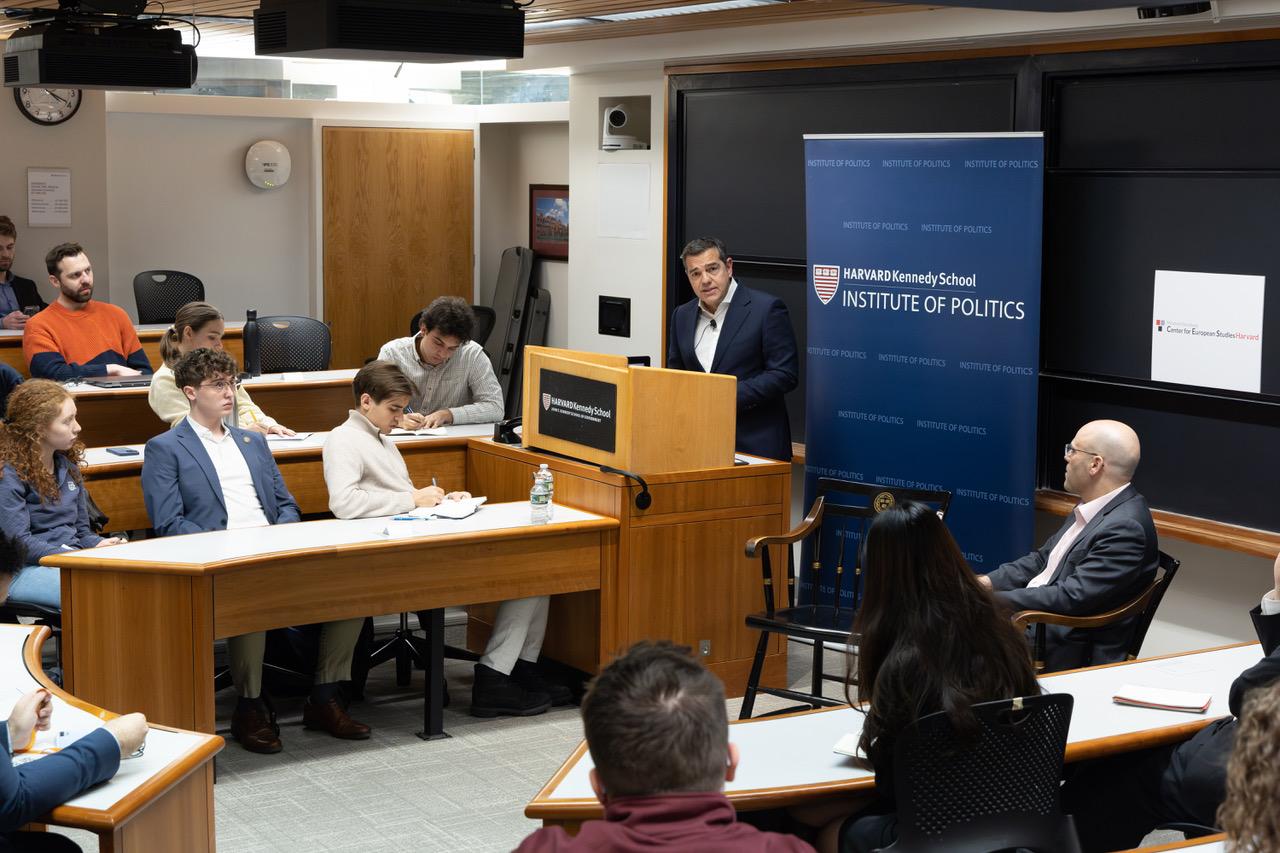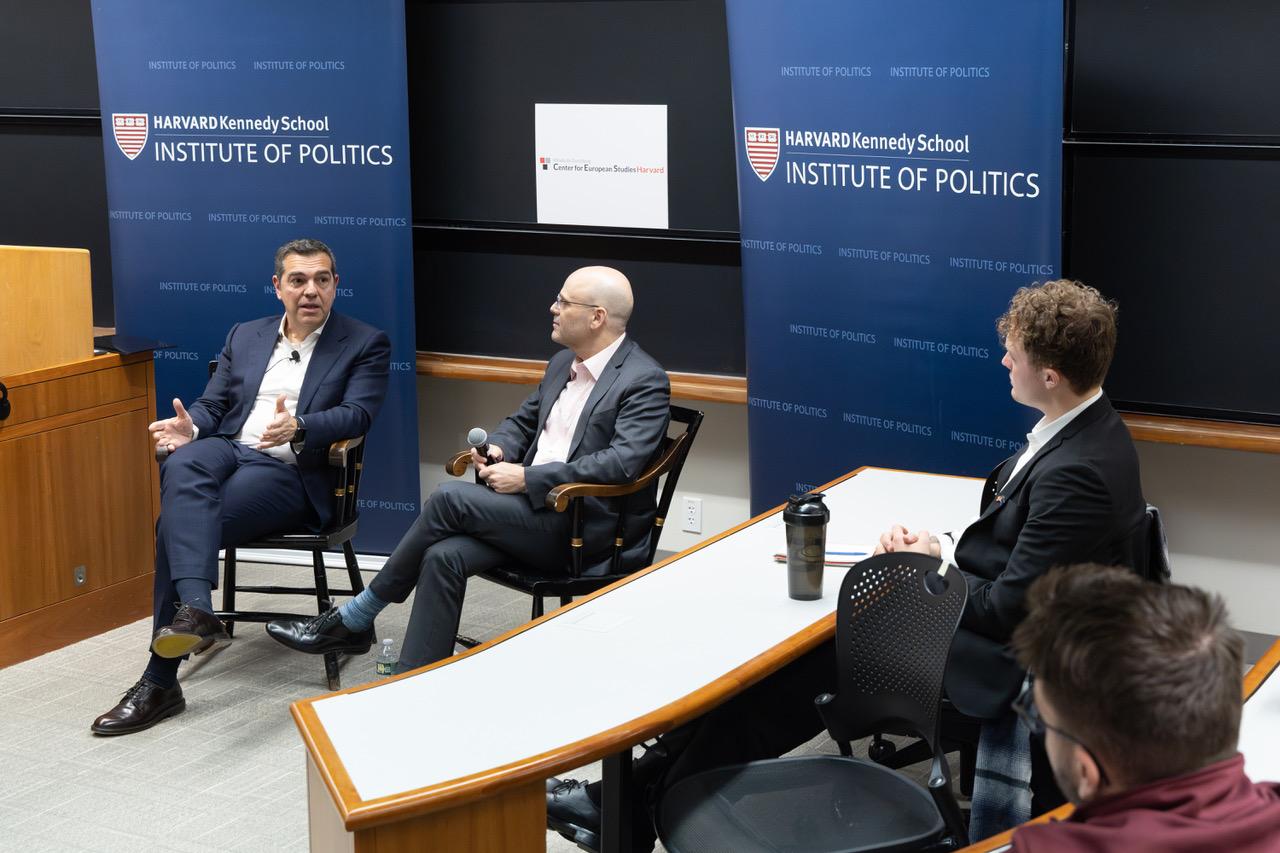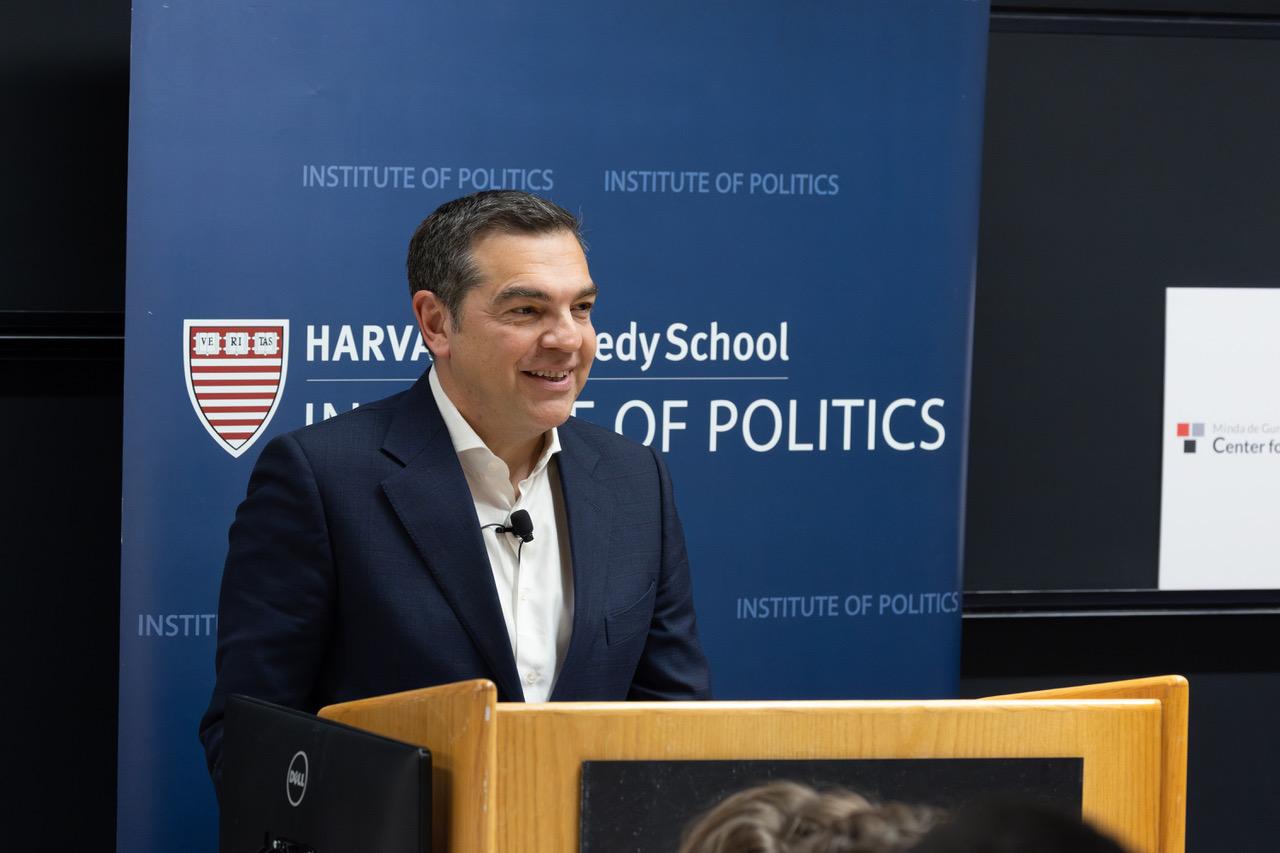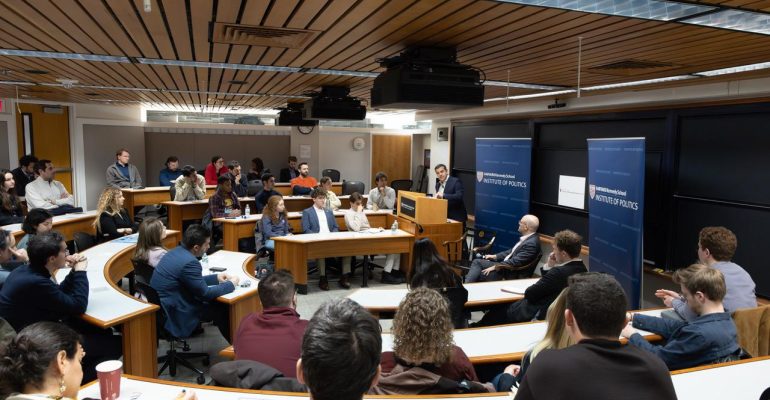“Thank you very much Daniel.
Thank you Summer.
And I would like to warmly thank the Harvard Kennedy School, the Center for European Studies, the Institute of Politics και the Center for Public Leadership, for today’s invitation.
I think I will not surprise anyone here if I say that the discussion we’re having today, is more necessary than ever.
In recent years, we have seen progressive forces retreating in the USA and Europe and losing their traditional support in big parts of the working and middle classes.



At the same time, we see the Far Right gaining ground dangerously, and receiving support from segments of society who traditionally voted for the left.
However, this trend is connected to a broader phenomenon of strengthening the influence and power of authoritarian leaders and regimes on a global scale.
I believe that these two phenomena are connected.
In a world where the USA is the most powerful force but does not have hegemony, the models of authoritarian capitalism that we see strengthened in the economy, like China, or winning at the geopolitical level, like Russia, become attractive.
In other words, it is no longer a taboo for large segments of Western societies to believe that Western capitalism will become stronger and better serve their interests, if it appropriates elements from these systems.
And if it leaves behind some of the democratic institutions and rights, which are seen as burdens.
At the same time, at the level of our political systems, I would like to focus on two main causes, in my opinion, for the distancing of parts of the working and middle classes from progressive political forces.
The gradual shift of those political forces to the right and the generalized feeling of insecurity, created by multiple crises.
I believe, first of all, that starting from the 1990s, a large part of the working and middle classes invested in the so-called “third way” and the logic that the Democratic Party in the US and social democratic parties in Europe could manage the globalized economy to their benefit.
However, as it turned out, the adoption of neoliberal economic policies, such as free trade agreements that did not effectively protect workers, market deregulation, the strengthening of financial capital, and privatizations, led to accelerated deindustrialization and increased inequalities.
So even before the economic crisis that began with Lehman Brothers, there was a sense among a large part of working people that there was no substantial difference between center-left and center-right parties.
Many continued to support the progressive option, mainly for ideological or identity reasons, but the economic outlook that usually determines electoral results was not radically different for these voters.
So, gradually, a large part of the working-class either distanced itself from mainstream options, or accepted that there was no reason to remain devoted to progressive forces and could easily try other options.
From 2008 onwards, we enter a different era of multiple and interconnected crises that lead to a profound questioning of Western states’ abilities not only to make their citizens’ lives better, but even to protect them and their families.
First, the global and European economic crisis.
Then the refugee-migration crisis.
In parallel, a huge security crisis that weakened the global standing of the USA and the West in general. Concerning the failure of Western policies in Iraq, Afghanistan, Libya, Syria, Israel, and Palestine, and more recently in Ukraine.
Then, a global pandemic crisis.
And an an energy crisis leading to an inflation crisis.
And of course, all these crises unfolded in the context of a broader climate crisis.
So, in 2008 we entered an era of generalized insecurity.
In the face of these successive crises, progressive forces either did not always remain faithful to their values or faced developments with great uncertainty.
In the economic crisis, many progressive forces in Europe aligned with or tolerated the imposition of a German economic policy that protected bankers and increased inequalities.
While the Democratic Party in the USA – which for the first time had saved the American economy and held the fate of Wall Street in its hands- did nothing to limit Wall Street power or make those who were responsible, pay.
Regarding refugees and migration, some forces attempted to fight for a balanced policy of border protection and human rights, but soon promoted or tolerated anti-immigration policies.
In the face of the climate crisis, the green agenda was not promoted within the framework of a just transition, resulting in the feeling among the most vulnerable citizens that the burdens fell on them, while companies got richer.
On the issue of war, in Ukraine and Palestine, progressive forces did not maintain a stance of actively defending both peace and international law, leaving room for the Far Right to do so in the case of Ukraine, with President Trump imposing neo-colonial terms on Kyiv.
In general, the big picture is that the left and progressive forces today do not project an effective response to citizens’ demands for security that can incorporate, at the same time, progressive values.
They have almost handed over this project to the right and the Far Right.
The left’s analysis remains vague and complicated,
Of course, it is true that the questions and challenges of the modern world are complex.
But the Far Right succeeds in giving simplistic answers that seem more attractive, although they are usually deceptive.
The question is, how can we reverse this course?
I will attempt to give an answer based on three axes:
First axis: social justice.
Progressive forces must focus on returning to the historical dividing line between left and right, which is addressing social inequalities and restoring social cohesion.
That means confrontation, on the basis of an anti-oligarchic platform.
Especially in a period when oligarchs and billionaires are attempting not only to expand their wealth and control the government but to replace executive power.
But I want to be clear.
Such a confrontation can bring a large part of the working and middle class voters back, only if it provides economic prospects for their future and the future of their children.
So in a period when the far right and other anti-systemic forces are trying to undermine every state and parliamentary institution with simplistic arguments, the left must fight for the upgrading of the institutional functions of the state.
To fight for the social and redistributive role of the state.
But also for the developmental and regulatory role of the state and the support of innovative and productive economic forces.
We need, therefore, a progressive economic patriotism that invests sustainably on national capabilities and comparative advantages, in human and natural resources, as well as in new technologies in a digital era.
And leads to trade policies that protect the interests of our workers, without creating trade wars and the global insecurity we are witnessing.
We need a policy that is not based on the narrative of the elites, where – as Michael Sandel says – only those who manage to become scientists or high-level managers have value.
But within a logic that supports public education at all levels and attributes workplace and social dignity to every professional category.
As Enrico Letta says, we need to secure the freedom of citizens to live with dignity in the place where they reside, and particularly rural areas.
Instead of only helping those who can exercise the freedom to move between New York and Los Angeles or Berlin and London.
Second axis: progressive forces must appropriate the concept of human security in an era of multiple crises and destabilization.
This means prioritizing the importance of institutional resilience, scientific expertise, and effective policies for addressing challenges such as promoting global and regional peace, the climate crisis, pandemics, and managing refugee and migration flows.
And to bring back to the forefront, forgotten or neglected values and needs.
First of all, the need to protect human life with strong health and social welfare systems.
The need for Europe to have a leadership role not only as a force of deterrence, but also a force for peace and stability.
The need to find a balance on the refugee/migration issue, which protects borders but also human rights, against a xenophobic logic.
And finally, the need to promote a just transition to the green agenda in a way that does not place disproportional burdens on citizens, but on those who hold wealth and simultaneously pollute the planet more.
The combination of the first and second axes, has a common denominator. The need to prioritize taxation of great wealth.
If this does not clearly become the primary goal of the left and progressive forces, they will neither be able to differentiate themselves from the right, nor create a realistic expectation of alternative governance that will change people’s lives.
The third axis must be international cooperation and coordination for democracy and justice against authoritarian and nationalist policies that undermine our democracies.
I believe that both President Biden and Chancellor Scholz promoted some important policies after the crisis.
But they were based on delivering services and support to working people, without any clear social vision that unites policies into some long-term goals.
No vision with which large segments of society can identify for the next decade.
At the same time, the far right presents itself as having a plan for the present and the future. As frightening and dangerous as it is, it seems to have a plan for shaping our societies, with which many working-class people identify.
And it has built a movement.
Although it is based on national retrenchment and national supremacy, its forces cooperate at both European and international levels.
Sometimes Bannon and other times Musk, attempt to coordinate the forces of the Far Right, and they do not hesitate even to intervene in the internal affairs of third states, as Russia often does not hesitate to do.
It is a huge contradiction that there are no serious initiatives for coordination of progressive forces at a global level and especially on both sides of the Atlantic.
As you know, 25-30 years ago, we worked together after Seattle, in Genoa, in Florence, and in Porto Alegre in a huge movement that stood against the neoliberal globalization that led to the global crisis. And against the war in Iraq that led to destruction.
I remind you that we stood together against the power of Wall Street and the bankers who led us into crisis, 15 years ago.
With the Occupy Wall Street movement in the USA and the movement that was born in city squares, against austerity in Europe.
Today we need a third movement.
For Justice and Democracy.
That will stand against the widening of inequalities, authoritarianism, and nationalism. War and racism.
Against the manipulation of knowledge and information through the control of artificial intelligence, against the destruction of the planet and life, against the power of billionaires who work for their own interests at the expense of the social majority, across our planet.
Thank you very much”
